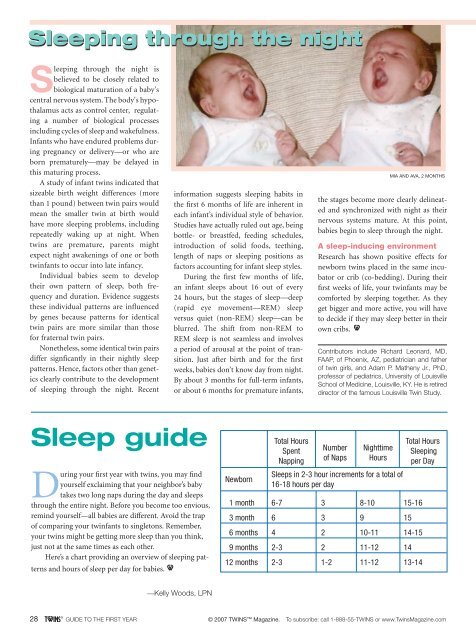2007GuideToTheFirstYear
You also want an ePaper? Increase the reach of your titles
YUMPU automatically turns print PDFs into web optimized ePapers that Google loves.
Sleeping through the night<br />
Sleeping through the night is<br />
believed to be closely related to<br />
biological maturation of a baby's<br />
central nervous system. The body's hypothalamus<br />
acts as control center, regulating<br />
a number of biological processes<br />
including cycles of sleep and wakefulness.<br />
Infants who have endured problems during<br />
pregnancy or delivery—or who are<br />
born prematurely—may be delayed in<br />
this maturing process.<br />
A study of infant twins indicated that<br />
sizeable birth weight differences (more<br />
than 1 pound) between twin pairs would<br />
mean the smaller twin at birth would<br />
have more sleeping problems, including<br />
repeatedly waking up at night. When<br />
twins are premature, parents might<br />
expect night awakenings of one or both<br />
twinfants to occur into late infancy.<br />
Individual babies seem to develop<br />
their own pattern of sleep, both frequency<br />
and duration. Evidence suggests<br />
these individual patterns are influenced<br />
by genes because patterns for identical<br />
twin pairs are more similar than those<br />
for fraternal twin pairs.<br />
Nonetheless, some identical twin pairs<br />
differ signficantly in their nightly sleep<br />
patterns. Hence, factors other than genetics<br />
clearly contribute to the development<br />
of sleeping through the night. Recent<br />
information suggests sleeping habits in<br />
the first 6 months of life are inherent in<br />
each infant’s individual style of behavior.<br />
Studies have actually ruled out age, being<br />
bottle- or breastfed, feeding schedules,<br />
introduction of solid foods, teething,<br />
length of naps or sleeping positions as<br />
factors accounting for infant sleep styles.<br />
During the first few months of life,<br />
an infant sleeps about 16 out of every<br />
24 hours, but the stages of sleep—deep<br />
(rapid eye movement—REM) sleep<br />
versus quiet (non-REM) sleep—can be<br />
blurred. The shift from non-REM to<br />
REM sleep is not seamless and involves<br />
a period of arousal at the point of transition.<br />
Just after birth and for the first<br />
weeks, babies don’t know day from night.<br />
By about 3 months for full-term infants,<br />
or about 6 months for premature infants,<br />
MIA AND AVA, 2 MONTHS<br />
the stages become more clearly delineated<br />
and synchronized with night as their<br />
nervous systems mature. At this point,<br />
babies begin to sleep through the night.<br />
A sleep-inducing environment<br />
Research has shown positive effects for<br />
newborn twins placed in the same incubator<br />
or crib (co-bedding). During their<br />
first weeks of life, your twinfants may be<br />
comforted by sleeping together. As they<br />
get bigger and more active, you will have<br />
to decide if they may sleep better in their<br />
own cribs.<br />
Contributors include Richard Leonard, MD,<br />
FAAP, of Phoenix, AZ, pediatrician and father<br />
of twin girls, and Adam P. Matheny Jr., PhD,<br />
professor of pediatrics, University of Louisville<br />
School of Medicine, Louisville, KY. He is retired<br />
director of the famous Louisville Twin Study.<br />
Sleep guide<br />
During your first year with twins, you may find<br />
yourself exclaiming that your neighbor’s baby<br />
takes two long naps during the day and sleeps<br />
through the entire night. Before you become too envious,<br />
remind yourself—all babies are different. Avoid the trap<br />
of comparing your twinfants to singletons. Remember,<br />
your twins might be getting more sleep than you think,<br />
just not at the same times as each other.<br />
Here’s a chart providing an overview of sleeping patterns<br />
and hours of sleep per day for babies.<br />
Newborn<br />
Total Hours<br />
Total Hours<br />
Spent Number Nighttime Sleeping<br />
Napping of Naps Hours per Day<br />
Sleeps in 2-3 hour increments for a total of<br />
16-18 hours per day<br />
1 month 6-7 3 8-10 15-16<br />
3 month 6 3 9 15<br />
6 months 4 2 10-11 14-15<br />
9 months 2-3 2 11-12 14<br />
12 months 2-3 1-2 11-12 13-14<br />
—Kelly Woods, LPN<br />
28 GUIDE TO THE FIRST YEAR © 2007 TWINS Magazine. To subscribe: call 1-888-55-TWINS or www.TwinsMagazine.com


















